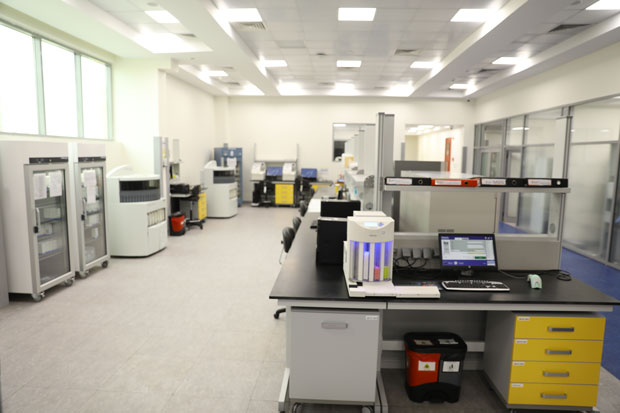Histone H3K27 & G34 Alterations

- Clinical Implications
- Diagnosis of Diffuse Midline Gliomas
- Diffuse hemispheric gliomas, H3 G34-mutant
- A distinct type of aggressive brain tumors.
- Most frequently presents in pediatric and young adult patients.
- Located in the cerebral hemispheres.
- Test Description
- Test approach
- Reporting name
- Test prerequisites (To ensure timely results)
- Patient’s demographic data.
- Clinicopathologic information:
- Pathology report (final or preliminary) including anatomic location.
- History of any given therapy for cancer and its date and relation to sample sent for molecular study (i.e. pre & post therapy). Therapy includes chemo and radiotherapy, hormonal or targeted therapy.
- Any other relevant clinical data or history.
- Type of sample:
- Preferred: Formalin-fixed, paraffin-embedded (FFPE) tumor tissue block.
- Acceptable:
- Section in Eppendorf: Up to 4 sections, each with a thickness of up to 10 μm and a surface area of up to 250 mm2 + good H&E slide for assessment.
- Five unstained slides + one good H&E slide.
- Specimen Minimum Volume: Two 10-micron sections of FFPE.
- Quality Control measures
- From your side:
- Double check you are fulfilling all required data before sending your sample.
- Check that your pathologist has selected the best block in terms of tumor cellularity, with least presence of necrosis and inflammation.
- Pretherapy sample is preferred (if underwent any cancer therapy).
- In our lab:
- Assessment of tissue for adequacy & tumor cellularity before any molecular analysis.
- Matching block ID with the report ID and demographic data.
- Matching the submitted block with the data reported in the pathology report.
- N.B.
- If the sample sent in Eppendorf, it is your pathology lab’s responsibility to ensure the sample in Eppendorf is corresponding to the submitted H&E slide (we can’t prepare slide from Eppendorf).
- This test does not include a pathology consultation.
- Test Time
- Retention of the sample
- Selected References
- Karremann M et al: Diffuse high-grade gliomas with H3 K27M mutations carry a dismal prognosis independent of tumor location. Neuro Oncol. 20(1):123-131, 2018
- Kleinschmidt-DeMasters BK et al: H3 K27M-mutant gliomas in adults vs. children share similar histological features and adverse prognosis. Clin Neuropathol. 37 (2018)(2):53-63, 2018
Diffuse Midline Gliomas Tumor: Infiltrative, midline glioma with predominantly astrocytic differentiation and K27M mutation in either H3F3A or HIST1H3B/HIST1H3C.
Bidirectional Sanger Sequence Analysis of Histone H3 K27 & G34 Alterations.
DNA was isolated and region specific primers were used to amplify K27M and G34 positions in H3F3A and HIST1H3B. Amplified PCR product then purified and subjected to bidirectional sequencing using ABI 3500 genetic analyzer.
Detection of Histone H3 K27 & G34 Alterations
All samples are subject to stringent quality control measures that include:
From 7 days to 10 working days.
Client provided paraffin blocks and unstained slides (if provided) will be returned after testing is complete.